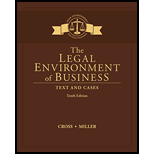
The Legal Environment of Business: Text and Cases (MindTap Course List)
10th Edition
ISBN: 9781305967304
Author: Frank B. Cross, Roger LeRoy Miller
Publisher: Cengage Learning
expand_more
expand_more
format_list_bulleted
Question
Chapter 3, Problem 1BS
Summary Introduction
Case Summary: The development of new discovery rules allows each attorney in the case to access all the evidences that the opposite side proposes to present, except the work product of the opposing attorney.
To Explain: The reason for not making opposite attorney’s work product available.
Expert Solution & Answer
Trending nowThis is a popular solution!

Students have asked these similar questions
You will be conducting a strategic analysis of the country and product you selected in module one. You will explore the optimal way for an AI-powered smart standing desk into the foreign country of Vietnam and develop a marketing plan to support its entry into this new market.
Executive Summary
The Executive Summary, which is always written last, is a high-level overview and provides major highlights of your project, you will add this to your submission in module 7 and it will appear first in your paper after your cover page.
This week's submission should include the following:
Company and Product Description
Provide a detailed description of the company
Provide a detailed description of the product
Outline and explain the advantages of your product
Describe a list of product benefits and features
Discuss any additional product line opportunities you may consider for your target market
Objectives and goals
Identify the aims and goals of your plan in this section of the…
???
Provide answer me
Chapter 3 Solutions
The Legal Environment of Business: Text and Cases (MindTap Course List)
Knowledge Booster
Similar questions
- I needarrow_forwardExpert please given correct answer with accountingarrow_forwardLCD Industries purchased a supply of electronic components from Entel Corporation on November 1, 2024. In payment for the $25.3 million purchase, LCD issued a 1-year installment note to be paid in equal monthly payments at the end of each month. The payments include interest at the rate of 24%. Required: 1. & 2. Prepare the journal entries for LCD's purchase of the components on November 1, 2024 and the first installment payment on November 30, 2024. 3. What is the amount of interest expense that LCD will report in its income statement for the year ended December 31, 2024? Note: Use tables, Excel, or a financial calculator. (FV of $1, PV of $1, FVA of $1, PVA of $1, FVAD of $1 and PVAD of $1) > Answer is not complete. Complete this question by entering your answers in the tabs below. Req 1 and 2 Req 3 What is the amount of interest expense that LCD will report in its income statement for the year ended December 31, 2024? Note: Round intermediate calculations and final answers to the…arrow_forward
- Hiarrow_forwardSolve with explanation and accountingarrow_forwardYou ordered 1,000 tons of cocoa beans, which will be delivered to your chocolate manufacturing plant in PA in March next year. The current price of cocoa beans, as of today, is $2,260 per ton. There is an investor company who currently offers two types of risk hedging contracts: -Forward contract: $2,400 per ton at a fixed cost of $30,000. -Futures contract: $2,400 per ton at a cost of $50 per ton (therefore, the up-front cost is 1000 tons * $50 per ton = $50,000) Assume that the price of cocoa beans went down to $2,200 per ton in March 2023. How much would you need to pay for 1,000 tons of cocoa beans under the futures contract?arrow_forward
arrow_back_ios
SEE MORE QUESTIONS
arrow_forward_ios
Recommended textbooks for you
 BUSN 11 Introduction to Business Student EditionBusinessISBN:9781337407137Author:KellyPublisher:Cengage Learning
BUSN 11 Introduction to Business Student EditionBusinessISBN:9781337407137Author:KellyPublisher:Cengage Learning Essentials of Business Communication (MindTap Cou...BusinessISBN:9781337386494Author:Mary Ellen Guffey, Dana LoewyPublisher:Cengage Learning
Essentials of Business Communication (MindTap Cou...BusinessISBN:9781337386494Author:Mary Ellen Guffey, Dana LoewyPublisher:Cengage Learning Accounting Information Systems (14th Edition)BusinessISBN:9780134474021Author:Marshall B. Romney, Paul J. SteinbartPublisher:PEARSON
Accounting Information Systems (14th Edition)BusinessISBN:9780134474021Author:Marshall B. Romney, Paul J. SteinbartPublisher:PEARSON
 International Business: Competing in the Global M...BusinessISBN:9781259929441Author:Charles W. L. Hill Dr, G. Tomas M. HultPublisher:McGraw-Hill Education
International Business: Competing in the Global M...BusinessISBN:9781259929441Author:Charles W. L. Hill Dr, G. Tomas M. HultPublisher:McGraw-Hill Education

BUSN 11 Introduction to Business Student Edition
Business
ISBN:9781337407137
Author:Kelly
Publisher:Cengage Learning

Essentials of Business Communication (MindTap Cou...
Business
ISBN:9781337386494
Author:Mary Ellen Guffey, Dana Loewy
Publisher:Cengage Learning

Accounting Information Systems (14th Edition)
Business
ISBN:9780134474021
Author:Marshall B. Romney, Paul J. Steinbart
Publisher:PEARSON


International Business: Competing in the Global M...
Business
ISBN:9781259929441
Author:Charles W. L. Hill Dr, G. Tomas M. Hult
Publisher:McGraw-Hill Education
